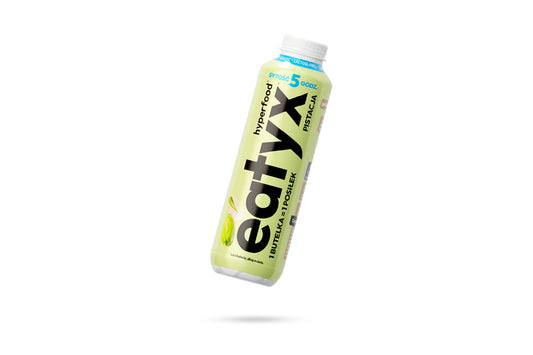Fiber is a unique nutrient - our body digests only a fraction of it, and yet it plays an absolutely key role in our functioning. Efficiently functioning digestive system? This is impossible without a daily dose of fiber! What exactly are the functions of dietary fiber and in which products can we find it most? We explain below.
What is fiber and how does it work?
Dietary fiber (or dietary fiber) is an edible part of plants and non-starchy carbohydrates, almost completely resistant to degradation by the human digestive system. The walls of plant cells (because yes, that's what fiber is in nature!) pass through the entire digestive system unchanged - digestion takes place at a certain level only in the large intestine. Thanks to this, fiber plays a role in the body that cannot be fulfilled by other nutrients that undergo intensive degradation.
Dietary fiber is divided into soluble and insoluble. The vast majority of it is the second part, which the bacteria of the digestive system cannot break down.
Insoluble fiber consists of celluloses, hemicelluloses and lignins - ingredients that stimulate intestinal peristalsis (or, to put it simply, support the movement of food through the intestines) and thus facilitate defecation. In turn, water-soluble fiber (which includes pectins and plant gums) is responsible for cleansing the intestines of unnecessary metabolic products, developing intestinal microflora and reducing cholesterol levels. Soluble fiber is also responsible for the feeling of satiety after a meal - that is why cereal products may sometimes seem more stuffy than others. But it is good; Regulation of appetite is a natural process, necessary for proper nutrition.
The role of fiber in a balanced diet
Non-digestible dietary fibers are an essential component of a daily, balanced diet. The minimum daily requirement for fiber is estimated at 25 g, and the optimal one - about 40 g. Theoretically, it's not much, right? However, it turns out that many people have a big problem with fiber consumption; the average Pole's daily diet contains approximately 15 g of it, which is much below the recommended values.
Is this our "national" problem? Not necessarily - the low share of fiber in the diet is a problem that dietitians have to fight against in most Western countries, where highly processed products (and therefore low in plant fiber) dominate. It is true that there are more and more options on the market for people who want to ensure the proper level of fiber without giving up life at a high speed - for example, our quick cold dishes , ready to eat in even 10 seconds or quick hot dishes ( also from eatyx! ), containing a solid dose of dietary fiber - but we are still a long way from the dietary "fiber" revolution.
What are the consequences? The most immediate is the occurrence of constipation - for people with fiber deficiency, it is usually the first sign that it is time to introduce some changes to the diet. In the long run, however, the lack of dietary fiber may contribute to the development of much more serious diseases: from digestive diseases, for example intestinal diverticulosis or kidney stones, to atherosclerosis, diabetes and problems resulting from elevated cholesterol levels.
As we mentioned, diets low in fiber are usually based on highly processed products - and therefore high in calories. It is therefore not surprising that researchers have been paying attention for years to the relationship between fiber deficiency and the development of obesity and related diseases. The regulating function of fiber is crucial for maintaining proper body weight - it is worth remembering!
Of course, too much of it is unhealthy. Too much fiber can also be harmful; it is often associated with problems with the absorption of vitamins and fats, as well as mineral deficiencies: calcium, zinc and iron. Therefore, it is worth supplementing a diet rich in plant fibers with products with an increased content of vitamins and minerals, such as the eatyx HYPER 18 VITAMINS & MINERALS dietary supplement.
Fiber – health-promoting and… slimming properties
Okay, so we know why we shouldn't avoid fiber in our diet (and why we shouldn't overdo it!). And what are its positive, health-promoting properties? What does fiber provide? Responsible for, among others: behind:
- regulating the feeling of satiety and appetite by delaying stomach emptying (food stays in the body longer);
- supporting the development of bacterial culture and intestinal microflora;
- stimulation of intestinal motility ("movement") - thus preventing constipation and controlling the proper rhythm of bowel movements;
- regulation of glucose and cholesterol levels in the blood - fiber helps prevent the development of circulatory system problems and is an irreplaceable ally in the fight against unnecessary kilograms (perfectly combined with, for example, the dietary supplement eatyx HYPER DETOX 360 , which provides plant extracts necessary for weight loss).
Where to find dietary fiber?
It is difficult to find fiber in products of animal origin or highly processed ones; its best source is unrefined plant products. We can find a lot of it in:
- fruit - both raw currants and raspberries, as well as dried figs, apricots and plums;
- raw vegetables;
- whole-grain cereal products (wholemeal bread, dark pasta, brown rice, coarse-grained groats - their processed, light counterparts are mostly "washed out" of fiber!);
- legume and sunflower seeds;
- pumpkin seeds.
It's hard to complain about culinary boredom in this case - products containing fiber can be easily introduced into your daily diet, either as an addition to basic meals or as an independent snack. Many of them (mainly cereal products) can be substitutes for processed products - perhaps it is worth replacing white bread with wholemeal bread? And regular pasta – the brown one?
Products rich in fiber will also fit perfectly into a typical diet "for busy people", in which an important role is played by, for example , quick meals ready to eat in even 10 seconds (!) from eatyx or dietary supplements providing essential vitamins and minerals (such as eatyx HYPER VITAMINS AND MINERALS + PROBIOTICS ) - people using our preparations just need to remember not to overdo it with fiber!



